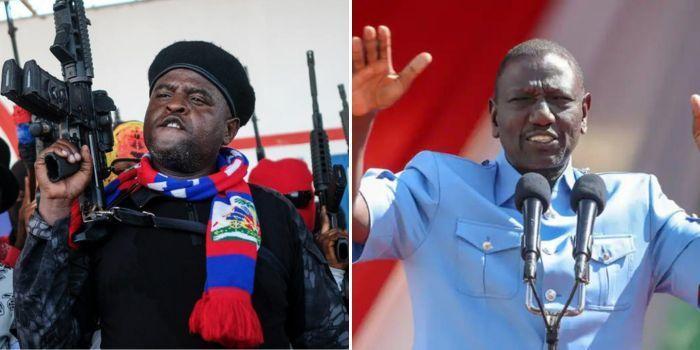Haiti Uproar: Public Radio Takeover as Court Blocks Ruto’s Police Deployment
The safety concerns of Haiti’s residents have escalated following a Kenyan court’s decision to suspend the intended dispatch of police officers tasked with combating gangs that currently dominate significant areas of the nation.
A Saturday report from the Associated Press revealed that shortly after Justice Chacha Mwita issued the ruling, citizens of the conflict-ridden nation started expressing their concerns by calling radio stations.
Certainly, several radio stations experienced interference due to an overwhelming volume of calls, causing concern among some victims who believed that the intensity of the war had escalated.
In the last year, the gangs have dominated 80 percent of the capital city, Port-au-Prince. There are growing concerns that it’s only a matter of time until the gangs seize complete control.
The prevailing concern expressed by most callers centered around the desire to understand the subsequent events following the court’s decision.
Justice Mwita, on Friday, declared the proposed deployment unconstitutional, highlighting that neither the National Security Council nor the National Police Service (NPS) possesses the authority to send officers abroad.
“To be clear, Article 240 does not mandate the Council to deploy police officers outside Kenya. Deployment should be as provided for in part 14 of the Act and only to a reciprocating country,” he directed.
“It is not contested that there is no reciprocal arrangement between Kenya and Haiti and for that reason, there can be no deployment of police to that country.”
ALSO READ:
- Why Money Collected From Tourists Was Banked in Swiss Accounts – Gov’t
- Hanna Cheptumo Says Her Family Is Worth Ksh.420 Million During Cabinet Vetting
- Ruto’s Gender CS Pick Blames Femicide on ‘Greedy Women Chasing Money’ — Claims Education and Independence Could Stop the Killings
- Kelvin Kiptum’s Father Demands Justice and Compensation from President Ruto
- Fuel Prices Drop in Kenya: EPRA Announces New Rates for April 2025
“An order is hereby issued prohibiting the deployment of police officers to Haiti or any other country otherwise than any compliance with part 14 of the NPS Act,” he added.
The Permanent Secretary for Foreign Affairs, Korir Sing’oei, expressed disagreement with the decision, expressing regret over Mwita’s omission of the police as a significant force.
“I have had to quickly review Justice Mwita’s judgment on the deployment of Kenya police contingent to Haiti under UNSC Resolution 2699. I disagree with the Learned Judge’s restrictive interpretation of the word “Forces” in part 243 of the Constitution to exclude the Police,” he argued.
“Such a restrictive approach fails to appreciate the legislative history behind the differentiation between “Forces” and “Service” in the Katiba. However, by determining that police deployment abroad can take place based on reciprocal arrangements, the Judgement doesn’t foreclose the Haiti Mission. Or does it?” He questioned.
The Court issued a decision in a case brought forward by Ekuru Aukot, the leader of the Thirdway Alliance Party. Aukot contended that the deployment authorized by President William Ruto was unlawful. The government had planned to send out 1,000 police officers as part of this deployment.
An earlier report by global media outlets indicated that the attacks had grown more intense with gangs taking over police stations and expanding outside city centers.
“I cannot overstress the severity of the situation in Haiti, where multiple protracted crises have reached a critical point,” Special Representative of the Secretary-General for Haiti Maria Isabel Salvador told the United Nations.
Haiti Uproar: Public Radio Takeover as Court Blocks Ruto’s Police Deployment
